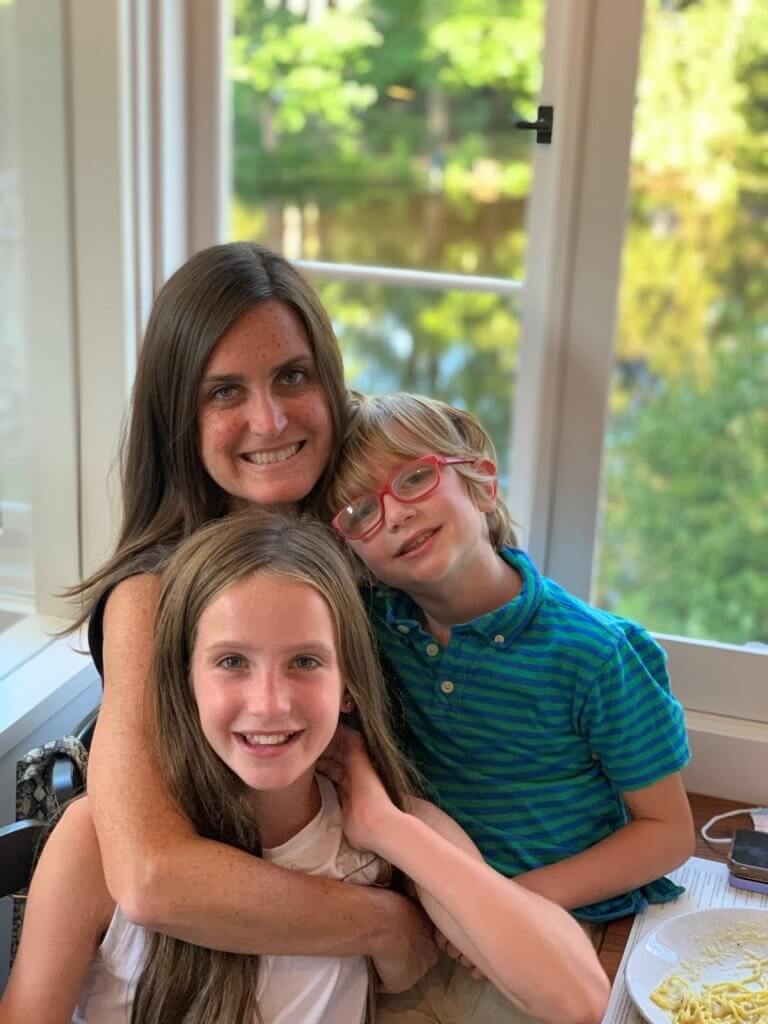As head of marketing for a leading international news agency, Kelly Ives routinely worked with journalists across the globe. When it came to chronic lymphocytic leukemia (CLL), however, it was her own reporting skills that led Ives to a life-changing treatment.
Ives was a 37-year-old mom with a career and three young children, including an infant, when she learned in September 2014 that she had CLL — a slow-growing blood cancer. The most common type of leukemia, CLL is still relatively rare, and the average age at diagnosis is 70. It is also not usually curable, and yet the oncologist Ives saw near her Connecticut home told her it would likely be 10 years before her disease required treatment.
While a “watch and wait” approach to CLL, and other cancers, is the best treatment approach for some patients, Ives wanted to be sure she was treated at a place that specialized in CLL and could provide the most cutting-edge treatment when the time came. She found it at Dana-Farber Brigham Cancer Center, home to the Center for Chronic Lymphocytic Leukemia — and Matthew Davids, MD, MMSc, clinical research director in the Division of Lymphoma.
“It was a relief that Dr. Davids knew so much about CLL, and particularly what some of my genetic markers would likely mean for my prognosis,” says Ives. “I saw him every three months for a year and a half when it was time for treatment. He helped educate me on the options that would be possible for me at Dana-Farber Brigham, and always gave me lots of hope.”
That hope, it turned out, would be well-founded.

Prognosis and progress
Although headaches are not a warning sign of CLL, Ives credits them for leading to her diagnosis.
“I was a typical harried mom, who rarely had time for the doctor,” says Ives. “I was going to break my annual physical in 2014, but when I started getting headaches I figured I might as well go.”
At her physical, her primary care physician noticed an alarmingly high white blood cell count in Ives’ blood work — which soon led to her CLL diagnosis.
“My first concern was for our youngest child, Ryan, who was only nine months old,” says Ives. “I was worried if I had this when I was pregnant, he could have gotten it too.”
Doctors assured Ives this was not the case, but it wasn’t until she transitioned to Dana-Farber Brigham that she felt she was around people who truly understood how best to treat her specific disease. The Center for Chronic Lymphocytic Leukemia is one of the few facilities in the world dedicated to CLL research and treatment. When Ives and her husband, David, met with Davids, they learned that Ives would likely be a candidate for treatment within a few years rather than a decade.
“We have made a ton of progress in CLL during the last decade,” says Davids. “Previously all we had was chemotherapy, and patients went through multiple rounds until we ran out of options within a few years. Now we have targeted drugs that we can combine in rational ways to more effectively kill the cancer cells while sparing other cells in the body. In Kelly’s case, because of her age, she was a perfect candidate for one of our clinical trials designed to provide an aggressive approach to younger CLL patients interested in a potentially curative strategy.”

In June 2016, when Ives was declared ready for treatment, Davids was leading a trial he wrote that combined a well-established CLL chemotherapy regimen called FCR with a molecularly targeted oral agent known as ibrutinib. Patients age 65 and under and with no prior CLL treatment were eligible for what he called the iFCR trial; the study included chemotherapy for three days each month, for six months, along with a daily ibrutinib pill. Ives was enrolled in the trial.
Trials and toasts
A Massachusetts native, Ives stayed with family during her trips to Dana-Farber Brigham for her chemotherapy infusions and check-ups. And after six months, a bone marrow biopsy and scans confirmed she was among the 37 percent of trial participants who had gone into complete remission with no minimum residual disease (MRD) in their bone marrow — nearly double the 20 percent remission rate seen historically in patients given FCR chemotherapy alone. Participants continued with ibrutinib after the six-month chemotherapy arm ended, and the percentage in remission rose to 57 percent.
Five years later, Ives is still taking the pill — and remains in complete remission. She travels to Boston each three months to visit with Davids and his team to make sure her disease has not come back. When possible, she and another young mom and iFCR trial veteran plan their appointments for the same day, so they can toast their latest positive check-ups over lunch.
“My kids are now 19, 10, and 7 1/2, and I am loving every day I get to enjoy with them and my husband,” says Ives, who has since joined Davids at several Dana-Farber Brigham events to raise awareness and funding for CLL research. “I feel like one of the healthier people around, and I’m enjoying opportunities to share my story and hopefully help others facing cancer. The way I look at it, if I didn’t have a memory, I wouldn’t even know I had CLL.”

I am 80 and took ibrutinub for 3 weeks, but had to stop when each additional pill caused a 102 spike in temperature.
What next?
Hi there,
Thank you for reading. Unfortunately, we aren’t able to provide personalized medical advice on this blog. We recommend you get in touch with your care team, who will be able to help with any questions you may have.
Wishing you the best,
DFCI
I am always amazed with the progress being made towards a cure for CLL. My husband will not be cured but has had eight years we didn’t expect to have thanks to Imbruvica. We appreciate both the research and care he has received at Dana Farmer.
I was in the same clinical trial as Kelly back in 2017 and it has been 3 years I am still in remission .
Goodmorning,
Do you have a trial for osteosarcoma? My son, 24 years old, had osteosarcoma.
Hello Marijke,
Thank you for reading. Information on osteosarcoma can be found here: https://www.dana-farber.org/bone-cancer-osteosarcoma/
Additional information on clinical trials can also be found at the below links:
Dana-Farber Clinical Trials: http://www.dana-farber.org/clinicaltrials
Dana-Farber/Harvard Cancer Center: http://clinicaltrials.dfhcc.harvard.edu/ / http://www.dfhcc.harvard.edu/about-dfhcc/contact-us/
National Cancer Institute: http://www.cancer.gov/clinicaltrials/search
We hope this is helpful and are wishing you all the best,
DFCI